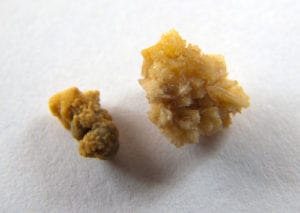Facts about Kidney Cancer

What Causes Kidney Tumors?
There is no singular cause that has been identified through scientific research. Studies indicate the factors that can contribute to the formation of kidney masses. They include:
- Obesity and poor eating habits
- Smoking
- Heredity
- Exposure to chlorinated chemicals
- High blood pressure
Symptoms of a Kidney Mass
Symptoms are rare during the early stages of a kidney mass. As the tumor grows, the following may occur:
- Side pain between the ribs and hips
- Persistent pain on one side of the low back that is not related to an injury
- Blood in the urine
- Low red blood cell count
- Unexplained weight loss
- Loss of appetite
- Persistent fever unrelated to infection
Diagnosing and Treating Kidney Masses
More than half of kidney tumors are found accidentally. The mass may be discovered during a routine exam or screening to assess another health complaint. A urologist is often involved in the diagnostic process and is the specialist who develops the most appropriate treatment plan for kidney tumors. Using various labs and forms of diagnostic imaging, a urologist grades and stages the tumor. Treatment is then planned based on that measurement. The goal of treatment is to eliminate cancer cells and, when possible, preserve kidney function.
Not all kidney tumors require surgery. Generally, treatment options include:
- Active surveillance. Periodic measurements of the tumor. Appropriate for tumors up to 3 cm.
- The use of hot or cold therapy to destroy the tumor.
- Partial nephrectomy. The removal of part of the kidney.
- Radical nephrectomy. Complete removal of the affected kidney.
In our Chattanooga, TN urology office, our mission is to treat urologic conditions such as kidney tumors promptly, so the patient can regain peace of mind and quality of life. To learn more about our services, call: (423) 778-5910.



 When we hear about cancer, it is usually breast cancer or skin cancer. However, did you know that kidney cancer is up there among the top ten cancer diagnoses in our country? It is estimated that approximately 14,000 deaths may occur each year as a result of this disease. It is not the risk of mortality that warrants discussion, although that is, of course, important. What we want to point out is that 75-80% of patients diagnosed with stage I or II kidney cancer survive. The more you know, the better you can guard your health.
When we hear about cancer, it is usually breast cancer or skin cancer. However, did you know that kidney cancer is up there among the top ten cancer diagnoses in our country? It is estimated that approximately 14,000 deaths may occur each year as a result of this disease. It is not the risk of mortality that warrants discussion, although that is, of course, important. What we want to point out is that 75-80% of patients diagnosed with stage I or II kidney cancer survive. The more you know, the better you can guard your health. If you know someone who has had a kidney stone, you know someone who has likely experienced some of the worst pain of his or her life. Because stones are more prevalent in men than in women, and because one bout with kidney stones creates a higher likelihood of another, we want to help you implement habits that will reduce your risk.
If you know someone who has had a kidney stone, you know someone who has likely experienced some of the worst pain of his or her life. Because stones are more prevalent in men than in women, and because one bout with kidney stones creates a higher likelihood of another, we want to help you implement habits that will reduce your risk.